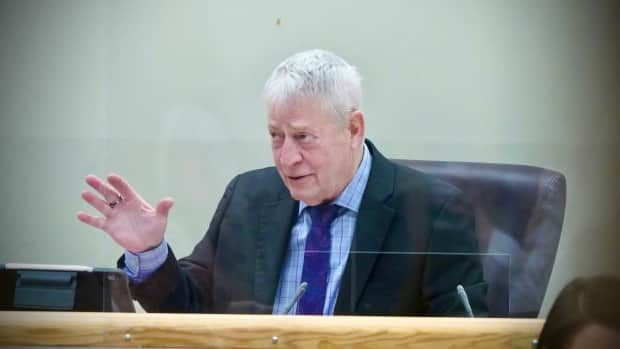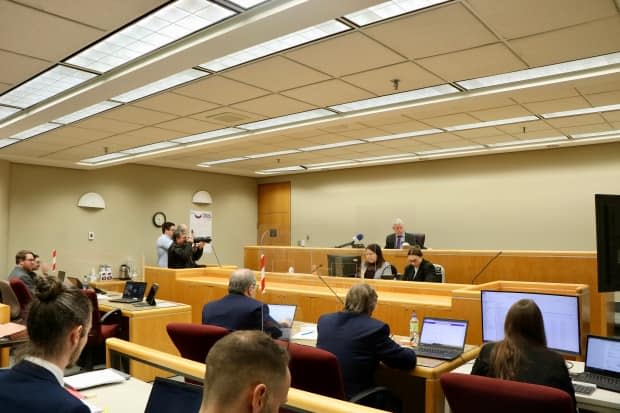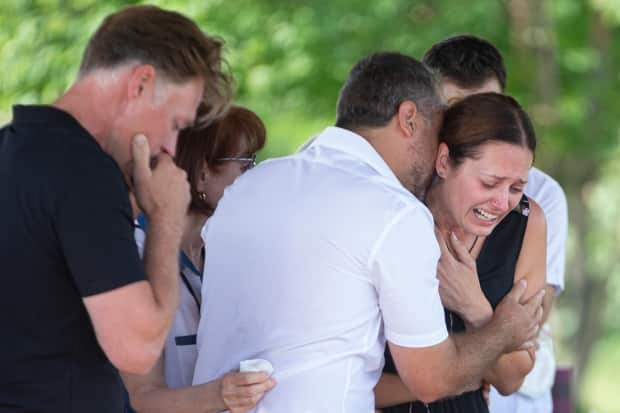Mother of 2 murdered girls tells Quebec coroner's inquiry 'there is no pause in my grief'

WARNING: This article contains distressing details.
Standing before a crowded Quebec City courtroom, Amélie Lemieux recounted the events surrounding the deaths of her two daughters in July 2020.
Breaking down and clenching a tissue to her face, she told the courtroom, "there is no pause in my grief," as she shared memories about the last time she saw her girls, Norah and Romy Carpentier, ages 11 and 6, on a hot July day.

"I always thought I would be the last person something like this would happen to," said Lemieux.
The girls went missing on July 8, 2020 after a crash along Highway 20 in Saint-Apollinaire, Que.
Their disappearance triggered one of the longest Amber Alerts in the province's history before their bodies were found three days later in a wooded area nearby.
A little more than a week later, police found the body of their father, Martin Carpentier. According to a coroner's report, he likely killed the girls with a blunt object on July 9 before taking his own life.
Quebec's public security minister asked the coroner's office to launch a public inquiry into the sisters' deaths after a Radio-Canada investigation revealed the search for the missing girls was mishandled.
Opening the first session in the inquiry — expected to last at least a month — coroner Luc Malouin offered his condolences and expressed his commitment to discovering the circumstances of the girls' deaths, as well as making recommendations to prevent similar tragedies.
He says to do so, it's necessary to understand the girls' lives before the accident as well as the rescue efforts in the days that followed their disappearance.

Girls' mother recounts meeting Carpentier online
Testifying for the better part of the morning, Lemieux answered questions about her relationship with Carpentier, describing how they first met online in 2008, when she was already pregnant with Norah, her first daughter.
"We quickly hit it off," said Lemieux, adding that Carpentier had understood that her plan was to raise her daughter alone. Still, they decided to move in together and later got married in 2010.
That same year, Carpentier legally adopted Norah.
From the start, Lemieux said, they had communication issues in their relationship but Carpentier was a "great dad." Although he wasn't as close with Romy, he was very involved with his adopted child, Lemieux's first-born Norah.
She said that in 2013, after Romy's birth, their relationship deteriorated while she was on maternity leave, didn't have a full salary and money worries came to the fore.

Not too long afterward, they started couples therapy, she said, but despite this, they grew more distant —almost like "roommates" — and the relationship became even more tense once Lemieux returned to work.
She says the relationship reached a breaking point in 2015 and she informed Carpentier that she wanted to leave, despite his objections.
By the start of 2020, the pair was still married but had separated and were sharing custody of the children.
'Martin became dangerous the moment he killed my kids'
The day of the accident, Lemieux recalled the interaction she had with Carpentier when he came to pick up the girls: he thanked her new partner for "taking care of my wife."
She says she found the remark "odd" and also noticed how thin Carpentier had become.
Later that evening, Lemieux says she was in bed, asleep, when the police called about the girls' disappearance.
"[They asked] 'Mrs. Carpentier, are your kids with you? And I told them 'No, they are with their father,'" said Lemieux, who said that was when they informed her about the accident and said that all three were missing.
"I became hysterical, I couldn't control myself, I just wanted to know where my kids were."
In the hours that followed, Lemieux says she just "tried to survive" as she was questioned by police and tried to tell them how urgent it was to find Carpentier.

"Martin [Carpentier] is scared. Find him, because he will not come out of the woods. I knew it, it was a [gut] feeling," said Lemieux.
When questioned if Carpentier had ever been violent before, Lemieux responded, "Martin became dangerous the moment he killed my kids."
'Not the Martin I knew'
Carpentier was not the kind of person to hurt people, testified Kevin Lemieux, a friend and colleague of his.
Lemieux knew Carpentier for about four years and approaching July 2020 says he noticed Carpentier seemed more tired, perhaps depressed, and seemed to be having difficulty making decisions at work.
A constant thread was his fear of losing custody of his kids.
Carpentier's partner at the time of the incident, whose name is protected by a publication ban, echoed this observation.
During emotional testimony in the afternoon, she recounted how she told police about Carpentier's fear about losing his kids — a fear she says increased noticeably in July.
She says she last saw Carpentier and the girls on July 6 and, reflecting back on that day, she could "tell in his face that he was preoccupied" — but that he was never one to talk a lot about his feelings.
Before the evening of the accident, nothing seemed out of the ordinary, she said. Before they parted ways a few days prior, she says the four of them planned to get an ice cream on July 8.
"This was not the Martin I knew, that left the site of an accident with his two girls," his girlfriend told the coroner.

Difficult memories to relive
Recalling the days immediately after the girls' disappearance, Amélie Lemieux says she went driving with her friend the next day and showed the girls' photos to people in the area, even stopping at gas stations and shouting her daughters' names.
Overcome with grief while recalling the events, Lemieux began to sob and collapsed into a chair near the stand.
Before the morning session was adjourned, she shared her reaction to finding out about her daughters' deaths.
She said she began to scream.
"I fell [down] and it was all dark," said Lemieux. "When I'd hear terrible things like this on the television and radio … I was always thinking 'Oh I'm so lucky because they have a good dad.'"
Gilles Mailhot, a Montreal police investigator, also testified on Monday and presented cell phone logs that showed data from the night Carpentier disappeared.
More witnesses are expected to take the stand in the following days, including the girls' grandmother.
In addition to testifying, Lemieux will also be allowed to question witnesses through her lawyers.


